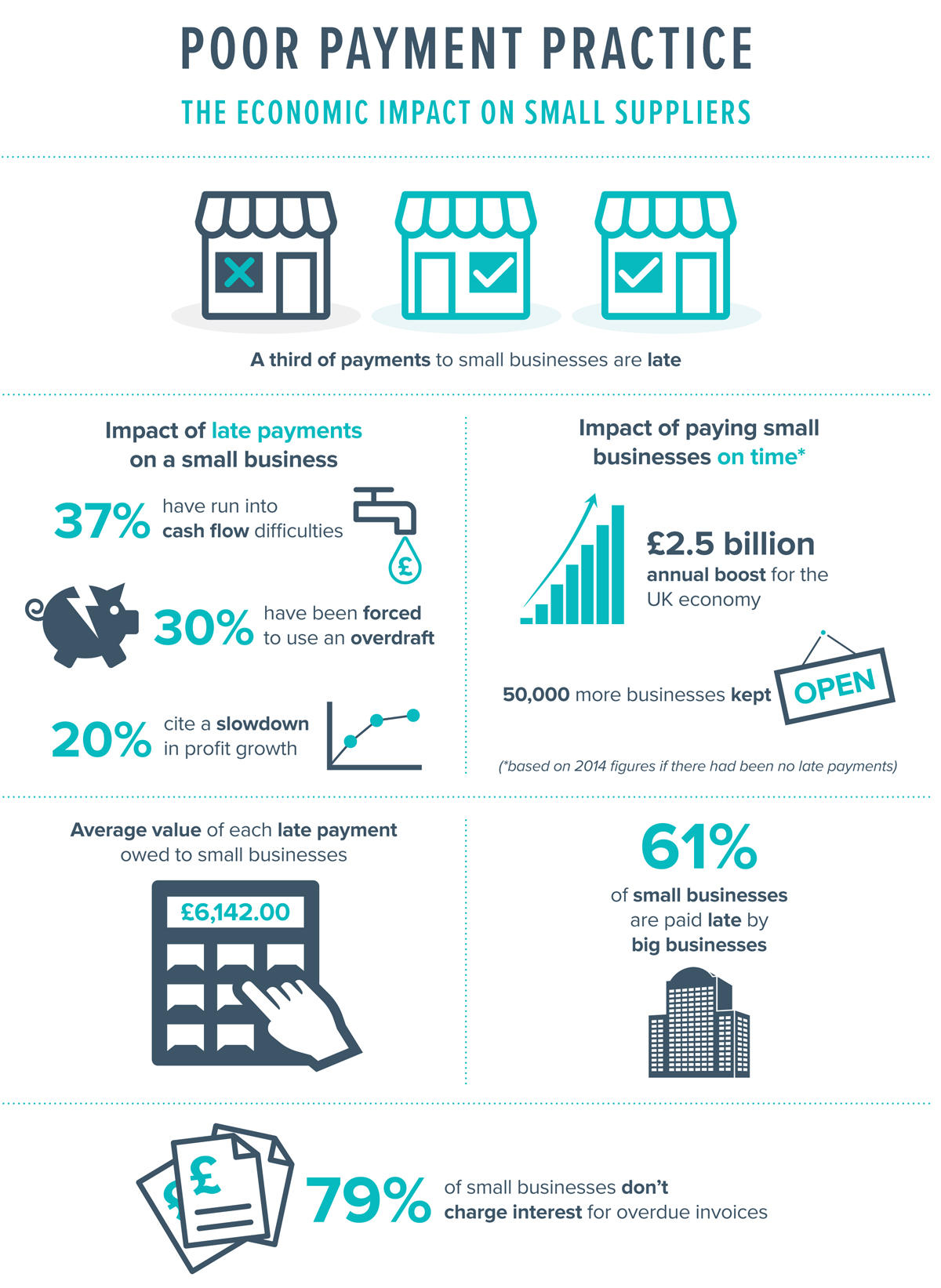Overview

Foreword
When large businesses pay late, it can put small firms out of business. It’s as simple as that. It also creates a negative payment culture, one which runs through supply chains and throughout suppliers.
Legislation states the period for payment in a business-to-business (B2B) contract should never exceed 60 calendar days, unless expressly agreed by both parties and provided that it is not grossly unfair to the creditor.2 In spite of this, poor payment practice now affects many of the 5.5 million small businesses that exist in the UK today.
Part of the reason why is because the payment terms of some large businesses have grown from 30 days to well over 100 days in some cases, with instances of supply chain bullying rife. This reflects a wider cultural trend, where payment terms are used to improve cash flow and the margins of larger businesses, at the expense of small suppliers. This harms small firms’ cash flow, seriously hampering their ability to invest, grow and in some cases, threatening their existence.
Both for small businesses and the UK economy, this is unacceptable and needs to stop. At the moment, poor payment practice is not taken seriously enough in the boardrooms of larger companies, particularly with regard to corporate governance strategies. The Government has recently signalled its intention to introduce new reforms on corporate governance, targeted at the behaviour and conduct of large businesses. Given the impact of poor payment practices by large companies on smaller ones, it is essential late payment becomes a central focus of this important government agenda.
FSB has led the debate on poor payment practice in the UK. Most recently, our work has sought to raise the profile of individual practices that lead to supply chain bullying, as well as an analysis of the impact of unfair contract terms, generally imposed by larger companies, is having on small firms.
This report examines and quantifies the significant economic impact of poor payment practice. In addition, it considers the policy interventions required to address a problem that is presenting a growing cost to the economy. Given current low levels of business confidence and high uncertainty, this cost is only likely to increase if nothing is done to address it.
Our research has found that, worryingly, the level of late payment in the UK is broadly unchanged from five years ago. However, we also reveal that ending late payment could significantly reduce business failures, contributing to a positive impact to the UK economy. We believe the time is now right for action to be taken, to drastically improve the UK’s payment culture and address some of the unacceptable practices carried out by larger companies.
Executive summary
The size of the problem
About a third of payments to small businesses in the UK are late (paid outside agreed contract
terms). FSB’s survey of about 1,000 small businesses highlights the scale of the problem of late
payment.3 On average, 30 per cent of payments are typically late, broadly unchanged from FSB
survey data from 2011 (28%) – suggesting the pervasiveness of late payments has not changed significantly in recent years. Only 12 per cent of small businesses in FSB’s latest survey said that customers always pay on time.4 About one in 10 small businesses say that 80% or more of payments are typically late.
The average payment delay is over a month long. The majority of late payments (84%) are more than two weeks late, with an average payment delay of about six weeks.
The average value of each late payment is not trivial, with small businesses saying that 60 per cent of late payments are greater than £1,000 in value, with an average value of £6,142.
Large private businesses are the most likely to pay small businesses late. Over three fifths (61%) of small businesses said payment from large private firms tended to be late.
Instances of supply chain bullying are rife across the UK’s payment culture. In a survey of 2,500 FSB members in December 2014, almost one in five (17%) said they had faced supply chain bullying in one form or another in the previous two years.5 The results indicated a serious deterioration of payment practices across a number of sectors.
Key findings
- 30 per cent of payments to UK small businesses are late.
- Average value of each late payment is £6,142.
- 37 per cent of small businesses say late payment causes cash flow problems.
- Ending late payments would have saved 50,000 UK businesses from failing in 2014.
- This would also increase the gross value added (a measure of economic output) to over £1 billion.
Recommendations
- Make it mandatory for all FTSE 350 businesses to sign up to the Prompt Payment Code and introduce a penalties regime for repeat offenders of poor payment practices. As previous attempts to persuade FTSE 350 companies to sign up to the Code have been insufficient, now is the appropriate time to mandate their participation with the Code. This should encourage more large businesses to actively review their treatment of suppliers and make payment practices central to their corporate governance strategies.
A new penalties regime led by the Code’s Compliance Board should also be introduced. This regime should be based on a “three strikes and you’re out” rule, which specifically targets repeat offenders of late payment. The Code should work with the Small Business Commissioner (SBC), when in place, to define what activity a strike would entail. Additionally, those signatories who commit the most egregious examples of supply chain bullying should be immediately struck off from the Code. For those signatories that wish to re-join the Code, they should be required to demonstrate that tangible steps have been taken to improve payment practices, with a final decision taken by the Code’s Compliance Board.
- Regulations should give the SBC a specific remit to directly address supply chain bullying. The SBC, when considering the conduct, behaviour and practice of larger companies, should have specific regard for instances of supply chain bullying. Regulations covering the scope of SBC’s remit should be reviewed on an annual basis to prevent it becoming too prescriptive.
- Supplier interests should be represented at executive board level as part of the Government’s ambition to strengthen the stakeholder voice on executive boards. Larger companies should be required to report annually to their shareholders on their payment practices. This could be achieved by including in their Annual Report the payment information they will have to publish from April 2017 as part of the Government’s new Duty to Report regulations. These companies should also be required to appoint a (non-executive) Director on their board, with a specific statutory duty to report on behalf of the company’s supplier, presenting their findings to their executive board and subsequently including them in the Annual Report.
- The SBC’s "name and shame" powers should be used effectively. The SBC’s ability to “name” companies should be used in a way that exerts the maximum influence and impact across the business community. This power should focus on the most serious instances of supply chain bullying. The SBC must also play a leading role in promoting good payment practice across the business community. Equally, the SBC must also use its powers to “name and praise” good practice and highlight positive examples where appropriate.
- A timetable around the appointment process for the SBC should be published immediately. Although proposals for the SBC were first announced in July 2015, no appointment has yet been made, despite one being expected in summer 2016. The Government should now publish a deadline for when the SBC will be appointed, in order to provide greater confidence amongst the business community that such an initiative will positively create culture change across the UK.
- Launch a marketing and communications strategy for the SBC. The Government should raise awareness of the SBC amongst the small business community as soon as the Commissioner is appointed. This should also be linked to raising awareness of existing initiatives, such as the challenge function of the PPC, which remains an under-utilised remedy with huge potential to help support culture change. It should look to involve Local Authorities, Local Enterprise Partnerships, Growth Hubs and representative bodies, to ensure the role of the SBC is understood by small businesses before it goes live.
- Payment information through the Duty to Report must be made accessible for small firms. The Government should look to launch digital resources alongside the launch of the Duty to Report which specifically allow small businesses to compare the payment practices of large companies as well as making the data shareable.
- Launch a joint industry-government taskforce on the future role of technology in addressing late payment. New technology has the potential to empower small firms by providing more ways of chasing late payment. A joint industry-government taskforce should examine how new technology and data sharing (including the new Duty to Report) can be used to improve the UK’s payment culture.
Full details on all of the above are provided in the downloadable report below.
Download the full report





